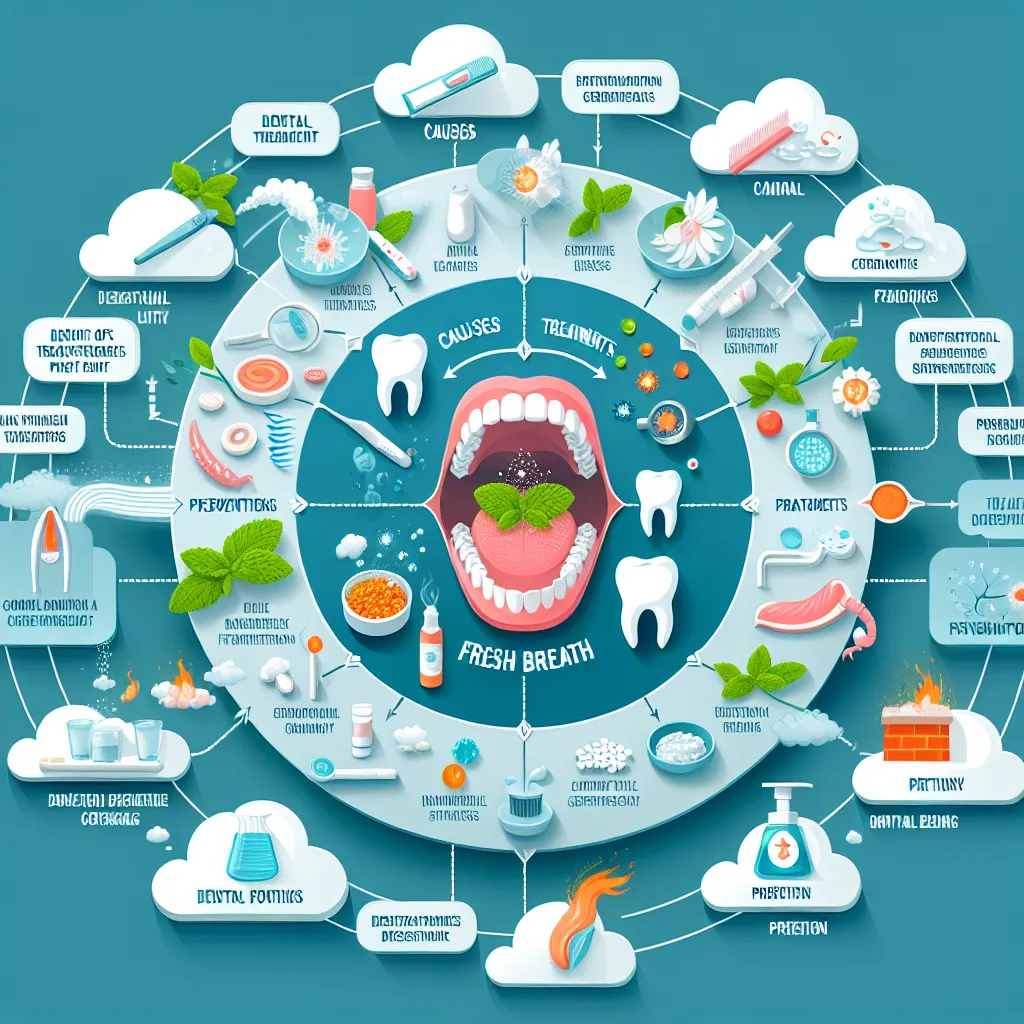
Exploring Halitosis Causes, Treatments, and Prevention for Fresh Breath
Halitosis, commonly known as bad breath, can be a persistent and embarrassing issue for many individuals. Understanding the root causes of halitosis is crucial in effectively addressing this condition. This post delves into the scientific explanations behind halitosis, explores clinical treatments, and suggests natural remedies for achieving lasting fresh breath.
The Science Behind Halitosis
Halitosis, commonly known as bad breath, is a condition that can be quite embarrassing and affect one’s confidence in social interactions. Understanding the science behind halitosis is crucial in effectively addressing and treating this common issue.
1. Causes of Halitosis
Halitosis can be caused by various factors, including poor oral hygiene, certain foods like garlic and onions, smoking, dry mouth, and underlying medical conditions such as gum disease and sinus infections. When food particles get stuck in between teeth, bacteria break them down, releasing foul-smelling gases that contribute to bad breath.
2. Oral Microbiome and Halitosis
The oral microbiome, the community of bacteria in the mouth, plays a significant role in halitosis. Certain bacteria species produce volatile sulfur compounds (VSCs) as they metabolize proteins, leading to the characteristic odor associated with bad breath. Maintaining a healthy balance of oral bacteria through proper oral hygiene can help prevent halitosis.
3. Saliva and Bad Breath
Saliva is essential in maintaining oral health and preventing halitosis. It helps rinse away food particles and neutralize acids produced by bacteria, reducing the risk of bad breath. Saliva production may decrease during sleep, explaining “morning breath,” a common form of halitosis experienced upon waking.
4. Treatment and Prevention
Effective treatment of halitosis involves addressing the root cause. This includes maintaining good oral hygiene practices such as brushing teeth twice a day, flossing, using mouthwash, and regular dental check-ups. Drinking water regularly can help keep the mouth hydrated and reduce dry mouth, a common contributor to bad breath.
Clinical Treatments for Halitosis
Halitosis, commonly known as bad breath, can be a distressing condition that impacts one’s confidence and social interactions. While proper oral hygiene practices such as regular brushing, flossing, and tongue cleaning are essential in preventing bad breath, some individuals may require clinical treatments to address underlying causes.
1. Professional Dental Cleaning
One of the primary clinical treatments for halitosis is a professional dental cleaning performed by a dentist or dental hygienist. This involves the removal of tartar and plaque buildup that can contribute to bad breath. During the cleaning, the dentist may also identify any signs of gum disease or other oral health issues that could be causing halitosis.
2. Treatment of Oral Infections
Halitosis can sometimes be caused by oral infections such as gum disease or tooth decay. In such cases, clinical treatments may involve the administration of antibiotics to eliminate the infection. Root canal therapy or tooth extraction may be necessary for severe cases of decay that are contributing to bad breath.
3. Periodontal Therapy
For individuals with advanced gum disease, known as periodontitis, periodontal therapy may be recommended. This treatment involves deep cleaning procedures such as scaling and root planing to remove bacteria and plaque from below the gumline. Periodontal therapy can help improve gum health and reduce halitosis.
4. Salivary Gland Treatment
In some cases, halitosis may be caused by issues with the salivary glands, leading to dry mouth. Clinical treatments to stimulate saliva production or address salivary gland problems may be necessary to alleviate bad breath. This can involve medications, lifestyle changes, or other interventions.
Natural Remedies and Home Care Practices for Combatting Halitosis
Halitosis, commonly known as bad breath, can be a pesky problem that affects many individuals regardless of age or gender. While there are various causes of halitosis, ranging from poor oral hygiene to underlying health issues, incorporating natural remedies and home care practices into your daily routine can help combat this embarrassing issue effectively.
1. Stay Hydrated
One of the simplest yet most effective ways to combat halitosis is by staying hydrated. Drinking an adequate amount of water throughout the day helps maintain saliva production, which is crucial for washing away food particles and bacteria in the mouth that can cause bad breath.
2. Practice Good Oral Hygiene
Brushing your teeth twice a day and flossing regularly are essential for keeping bad breath at bay. Using a tongue scraper to remove bacteria from the surface of the tongue can also help improve oral hygiene and prevent halitosis.
3. Incorporate Fresh Herbs and Spices
Chewing on fresh herbs like parsley, cilantro, or mint can serve as a quick and natural breath freshener. These herbs contain chlorophyll, which helps neutralize odors in the mouth and leave your breath smelling fresh.
4. Try Oil Pulling
Oil pulling, an ancient practice that involves swishing oil around in your mouth, has been known to improve oral health and reduce bad breath. Coconut oil is a popular choice for oil pulling due to its antimicrobial properties.
5. Avoid Certain Foods
Foods like garlic, onions, and spicy dishes can contribute to bad breath. Limiting your intake of these foods can help reduce the likelihood of halitosis. Instead, opt for crunchy fruits and vegetables like apples and carrots, which can help clean your teeth naturally.